It’s the feast (in some places and for some groups) of Bl. John Henry Newman. Who can forget his beatification by Benedict XVI?
Those of you who may be new readers may not know about the mug I made with a phrase of Bl. John Henry Newman: “To be deep in history is to cease to be a Protestant.“
Thinking back on the course of my own conversion, the elements which made it easier to take the plunge, and considering the growing projects of the Anglican Ordinariates, and also remembering that Benedict XVI – the Pope of Christian Unity – beatified John Henry Newman…. I put the phrase on a coffee mug.
Fill yours with Mystic Monk Coffee as soon as humanly possible.
Here is a shot of the regular sized coffee mug… I’ll bet you could put your yogurt and granola in it too.
The Z-Swag Store is HERE.
A shot of the larger coffee mug.. I’ll bet that you could put … hot chocolate in it too!
You see that for this mug I really wrapped the design across most of its surface.
Here is the largest mug, the stein. I suspect that this might be coaxed into holding a beer.
The image itself (it’s larger on the mugs):
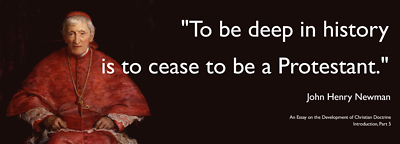
Here are three shots of the ur-mug, the larger coffee mug. It is made from the same durable stuff I punished for years in the microwave and dishwasher. Though I don’t have a dishwasher now… other than my hands.
I also made another version, with the phrase tighter on one side to make it easier to read:

After years of treating these things with great brutality in the nuclear reactor and the bottom rack of the washer near the heat, I succeeded in getting a crack in one of them, cosmetic, but not fatal.
It might start a conversation. But I suggest that before flashing it about, you might brush up on why being deep in history leads to the Catholic Church.
You can find all the links you need to Z-stuff HERE.
PS: I should have a NEW line rolling out tomorrow. I was inspired by how some nitwits in the combox of the Fishwrap (a more vicious place on earth you will not find) were ridiculing YOU READERS!

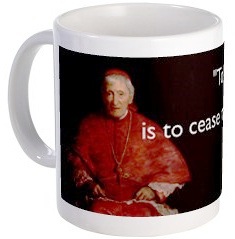
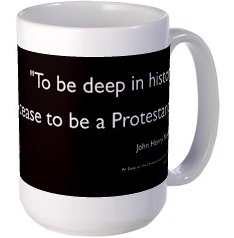
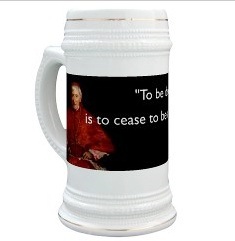
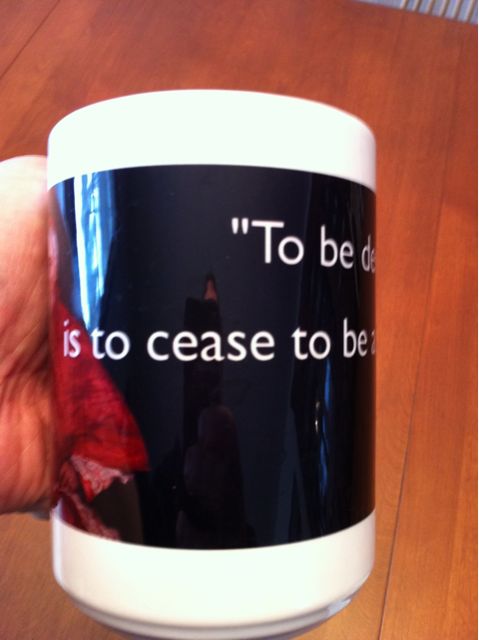
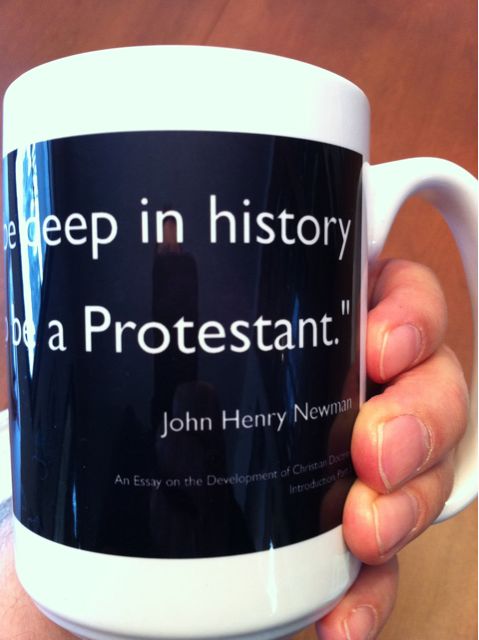
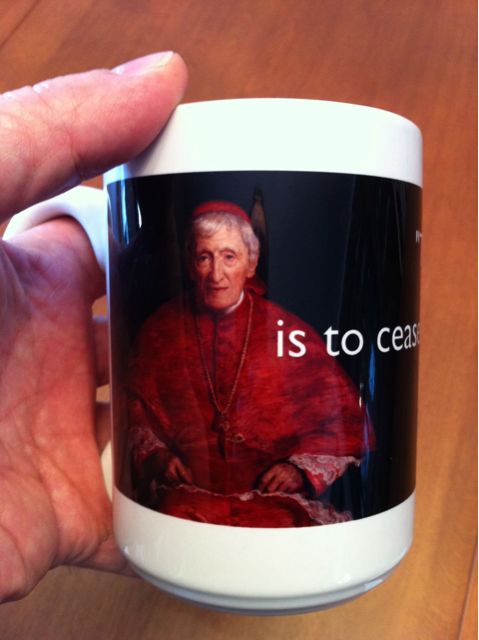

































Since Fr. Z not only writes “But I suggest that before flashing it about, you might brush up on why being deep in history leads to the Catholic Church”, but each mug – in a proper and courteous scholarly fashion – when providing the quotation tells where to find it, readers may want to visit http://www.newmanreader.org where that source, and many another work, and much else besides, may be conveniently consulted.
Speaking of Newman, I just finished reading some of his works. This paragraph may be of interest.
Newman, John Henry, 1801-1890.
The Arians of the Fourth Century
(Kindle Locations 6521-6524). London : Longmans, Green.
This book made available by the Internet Archive.
Appendix. 445
THE ORTHODOXY OF THE BODY OF THE FAITHFUL DURING THE SUPREMACY OF ARIANISM.
(Vide supra, p. 358.) THE episcopate, whose action was so prompt and concordant at Nicaea on the rise of Arianism, did not, as a class or order of men, play a good part in the troubles consequent upon the Council; and the laity did. The Catholic people, in the length and breadth of Christendom, were the obstinate champions of Catholic truth, and the bishops were not. … And again, in speaking of the laity, I speak inclusively of their parish-priests (so to call them), at least in many places; but on the whole, taking a wide view of the history, we are obliged to say that the governing body of the Church came short, and the governed were pre-eminent in faith, zeal, courage, and constancy. This is a very remarkable fact: but there is a moral in it. Perhaps it was permitted, in order to impress upon the Church … the great evangelical lesson, that, not the wise and powerful, but the obscure, the and unlearned, and the weak constitute her real strength. It was mainly by the faithful people that Paganism was overthrown.
All are ultra rad, Father Z!
The statement is indeed true. Allow me two observations:
1. Americans, because the American public schools are so shoddy, are not particularly well educated and thus ignorant of history. Perhaps this is the reason that America has so many Protestants. Americans also cultivate a host of historical myths which careful study would dispel. For example: It is false that the US won the War of 1812, false that Lincoln’ War was about slavery, false that Hoover and FDR had different programs to deal with the Great Depression, false that Cromwell was a beneficent ruler, false that the Inquisition killed billions, false that St. Paul doesn’t preach justification by works (see Romans, chapter 2).
2. Before we fault Protestants, a little self-criticism would be worthwhile for us. It has been my sad experience that American Traditionalist Catholics, as a rule, know little Church history before a.D. 1250. It is false that The Paschal Mystery isn’t Catholic and is absent in the early Church, false that the early church no daily Divine Office for laity, true to deny religious freedom is semi-Pelagian. Newman and the Oxford Movement weren’t so ignorant; indeed, they were the ones who started the Patristics revival.
When I discovered Catholicism at age 28, I wondered how all my Protestant pastors who’d been to seminary could have failed to mention all the amazing things I was learning. Now I have a partial answer to that question. I’ve been listening to a course in historical theology from a Protestant seminary that’s very anti-Catholic, because I was curious to know how the professor could support his claim that the early Church Fathers were basically good Evangelicals.
Twenty lectures in, I can report that these are his strategies:
1) Flat-out wrong statements. He actually says that the councils of Hippo and Carthage adopted a Biblical canon that did not include the Apocrypha.
2) Messing up what the Catholic Church teaches. He thinks that we consider the Pope to be an apostle, and he doesn’t understand the Catholic view of justification and calls it an impossible contradiction (which is just what Martin Luther thought when he said that it’s impossible to reconcile James with Paul.)
3) Leaving stuff out. He doesn’t mention any belief in the primacy of the bishop of Rome until St. Leo the Great’s time. And when it comes to the canonicity of the Apocrypha, the only opinion the professor informs his class of is St. Jerome’s.
There are far more examples than I’ve given. And this man’s class consists of future Protestant pastors! Cardinal Newman’s maxim still holds: no one in that room is deep in history.
Hey Sid Cundiff, I never noticed that about Romans 2!
Father, regarding the dishwasher, think of it this way: before you had one, now you have two!
“false that Lincoln’ War was about slavery”
Whoa, there. Bit of an overstatement.
The Chicken
Thank you, Rachel. Protestants are not only know history poorly; they also really don’t know scripture. For now I’ll speak of Paul.
1. For many of the Lutheran tradition (and Fr. Z might wish to correct me here) there is a canon within the canon. I’ve heard arguments from folk in that tradition that the Gospel is really just Paul. and not all of Paul, but just Galatians 3 and Romans 3&4, that the Gospels themselves are to be cherry-picked for pretty stories, and the rest of the Scripture can be ignored.
2. They falsely translate Romans 3: 21-26 to fit their dogma.
— In v.22 the Greek does NOT say “the righteousness of God through FAITH IN Jesus Christ FOR all who believe” BUT instead “The righteousness of God through FAITHFULNESS OF Jesus Christ INTO all who believe”.
— v. 25 does not say “whom God put forward as an ATONEMENT by his blood TO BE RECEIVED BY FAITH” but instead. “whom God put forward as an EXPIATION by his blood THOUGH FAITHFULNESS”. Paul means by “expiation” the lid on the Ark onto which, on the Day of the Rubbing Out, the High Priest sprinkles the blood of the animal for the purpose of expiation. And by pistis Paul doesn’t mean “faith/fides” but “faithfulness/fidelity/fiducia“.
— v. 26 doesn’t say “and that he justifies him WHO HAS FAITH IN Jesus” but rather “and justifies him OUT OF THE FAITHFULNESS OF JESUS.
Granted genitive constructions can be ambiguous, yet the One Who is faithful/Who has “faith” is Our Lord HIMSELF, not the believer. It is surprising how many Catholic Bibles keep these wrong translations of Romans 3, which I have taken from the RSV. Even the otherwise fine representative of the New Perspective(s) on Paul movement, James Dunn, argues for these false translations.
3. St. Paul got himself into a pack of trouble by Galatians. It was written perhaps five years before Romans. Galatians was written to oppose circumcision for gentiles. Romans was written to correct Paul’s view of the Torah and Judaism in Galatians, and to correct the view that Paul was a prot0-Marcionite. Between Galatians and Romans came Paul’s problems with the Corinthian church. You can hear the fellow who married his mother-in-law saying “But Paul, you said we didn’t have to follow the Torah [law]!” “That’s not what I meant” you can hear an angry Paul replying. Paul said what he meant in Romans.
4. In Romans 2: 5-8 Paul indeed teaches a Justification by works-righteousness, a passage pole-vaulted over by much Protestant exegesis. When E. P. Sanders, the founder of the New Perspective school, read these verses, he threw up his hands and declared Paul to be incoherent. N. T. Wright I think has it right that there are in fact three justifications (better righteous-makings) in Paul:
i. the righteous-making won by Our Lord, the Faithful One, on the Cross. (AND by His Resurrection!: Romans 4:22)
ii. this righteous-making applied to the faithful believer by his incorporation into Christ through the sacramental Paschal Mystery, Romans 6:1-11. (Though Wright doesn’t say it quite this way.) Indeed the central message in Paul is NOT “Justification by Faith” but rather the “incorporation into Christ”; en Christos is Paul’s repeated phrase.
i. the righteous-making at the Parousia mentioned in Romans 2, a righteous-making not by faithfulness but by good works.
5. When I had read the works of the New Perspective(s) on Paul, those of Sanders, Dunn, and Wright, I had the feeling that Protestantism had lost its very foundations. These men are not Catholics, I hasten to add, and Wright, a Low Church Anglican, has gone out of his way to oppose the Catholic Faith (and the Anglican Ordinariates), arguing that Trent’s language isn’t Biblical (and un-Biblical is the language of Nicaea homoousios and Chalcedon hypostasis — so are we to ditch the dogmas of Blessed Trinity and Our Lord’s divinity? I think not). Still the New Perspective people need more attention from Catholics; many Calvinists opposed them strongly.
So: To be deep in Scripture is to cease to be a Protestant.
Church history programs vary a lot. When I was in school, we had a pretty good fifth grade textbook on world history/Church history, which was better than I ever got in high school or college. (Though my own reading and the books at home covered a lot of stuff, including an intro to patristics.) But we got nothing on local Church history, which is a shame because most of the US and Canada have amazing Catholic histories and holy people. My junior high Ohio history textbook covered only the state and settlement history of religious groups that had died out or been killed dramatically, like Zoar and the Shakers, or Gnadenhutten.
Re: rabbit hole, Fort Sumter wasn’t attacked by Abraham Lincoln. […. Removed. o{]>:¬( ]
LINCOLN RABBIT HOLE CLOSED!
Let us Prayer that our Holy Father, Benedict, will consecrate Russia to Our Lady’s Immaculate Heart as she requested.